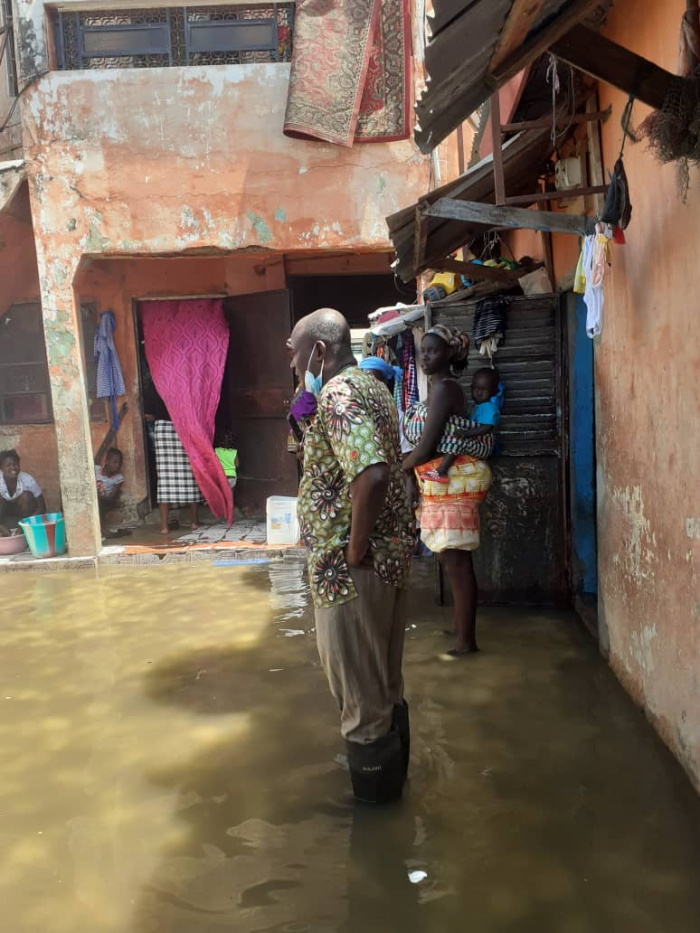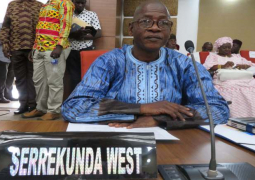
Talking to The Point Newspaper, Ousman Sillah, National Assembly Member for Banjul North Constituency where the flooding occurred, said multiple factors were responsible for the inundation among which was an increase of the water level in the canal and nearby swamps or ‘Tanbi Wetland’.
“The overflowing of the waste water in the canal started few days before the flooding which I noticed the other day when crossing the small bridge connecting the road from the National Assembly into Tobacco Road as the street was covered with this dirty water with a pungent odour,” said the Banjul North NAM. He added “the inundation is the culmination of multiple factors with days of heavy rainfall on the stagnant canal which is clogged with undergrowth and household garbage, including plastics, and exacerbated by the raw sewage water from the Sewage Station being emptied there thus increasing the water level to the point of flooding.”
In his response as the representative of the area, Hon. Sillah said his first move was to contact the managing director of NAWEC to inform him about the overflow of the rain and sewage water in the area around the bridge and who confirmed awareness and that something was being done to address it.
The Banjul North legislator said that he visited the area early on Sunday morning in order to understand the nature of the disaster, empathise with the victims and determine the next necessary steps to take in terms of response. He said it was very pathetic to see the families and their children stay in the dirty water which was everywhere in their compounds; bedrooms, kitchens and toilets. He added that some of them had lost foodstuff with bags of rice, clothing and furniture soaked.
“I tried and later got the permanent secretary of the Ministry of Works who was out of the jurisdiction at the time but linked me with one of their engineers as well as the consultant of the Banjul roads project and supervisors of Gai Construction to visit the Bund Polder Station overlooking the wetland,” he said.
The Banjul North lawmaker noted that the visit there revealed the outlying swamps in the outskirts of Banjul completely inundated with the rising water levels caused by encroachment or reclamation taking place in the Bund Road area and the Lasso Wharf stretch. He said the explanation given by the experts indicates that the combination of the pressure resulting from the reclaimed areas in the swampland, heavy rains, sewage water and clogged canal which doesn’t allow for the free flow of the water culminated in the flooding of the areas bordering the canal.
Hon. Sillah further told this medium that he also contacted both the National Disaster Management Agency (NDMA) and Gambia Red Cross Society (GRCS) to assess the situation and determine the form of intervention to make in terms of relief for the distressed victim families at Campama Estate.
The Banjul North NAM said there is no time for any blame game now as the victims need both immediate and long term solutions to address the present inundation as well as to prevent its recurrence in the future. He identified the stakeholders as the Government, Banjul City Council (BCC), NAWEC, Banjul roads project Contractor and the inhabitants of Banjul.
“The government should engage the stakeholders to remove the blockage in the canal and put a stop to the encroachment in the Tanbi Wetland as well as construct a good drainage system; BCC should put in place a system or measures that ensures the regular collection and disposal of garbage and public sensitisation to prevent indiscriminate dumping of waste and the cleaning of gutters and for NAWEC to stop emptying the raw sewage water into the canal by fixing the pipe that used to deposit it into the nearby sea,” concluded Hon. Sillah.





